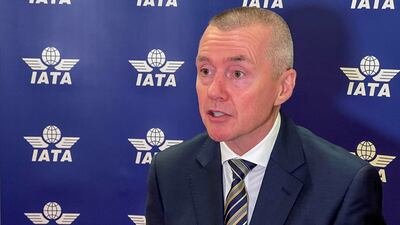The head of the world's largest airline trade body said on Tuesday that he is optimistic about government talks on reducing aviation emissions, but a lack of consensus will be viewed as a "failure" and "disappointment".
The comments came as the UN's International Civil Aviation Organisation's assembly of 193 nations met on Tuesday in Montreal to discuss the global “long-term aspirational goal” (LTAG) of net-zero carbon emissions by 2050.
“Anything shy of that in this assembly will be viewed as a failure,” Willie Walsh, director-general of the International Air Transport Association (Iata), said in an online press briefing from Montreal.
“While some of these targets are ambitious and the expectation is high, we have to be realistic that in the current environment anything short of ICAO agreeing to the long-term aspirational goal of net zero in 2050 will be a huge disappointment.”
In October 2021, airlines pledged to achieve a goal of net-zero emissions by 2050. Now, they are urging governments to go for the same goal and provide supporting regulations and policies.
While the ICAO assembly's failure to reach consensus on the LTAG will not stop airlines from working towards their target, an agreement would “send a very important signal to governments and would help to ensure we get the right policy framework in place to assist the industry in its ambition”, Mr Walsh said.
For example, airlines are calling on governments to provide incentives to energy suppliers for the widespread production and availability of sustainable aviation fuels, he said.
Government leaders rallying behind a net-zero target “would really provide a strong signal from governments that they're aligned with the ambition of the industry, aligned with the science behind climate change and, more importantly, it will provide the signal that we need a good framework and policy decisions that will support that goal”, Mr Walsh said.
He added that while he is “optimistic”, he also recognised there were challenges to reaching a global agreement.
Asked if he was concerned that ICAO was still discussing an "aspirational" goal, Mr Walsh said he was disappointed by the term.
However, if an agreement is reached on the LTAG, it would be an “excellent first step”, he said.
“Once this hurdle is cleared, I have no doubt it will become a much-hardened target by governments right across the world.”
The ICAO's 41st assembly meeting is crucial as it comes amid a discord over climate change and the impact of the Russian conflict in Ukraine.
The organisation's first meeting since the coronavirus pandemic will put pressure on world leaders to speed up climate reform, particularly as the gathering is held every three years.
“If the ICAO agrees to a long-term aspiration goal by 2050, I'd say well done, but certainly, I'm not going to celebrate it because it's the minimum requirement,” Mr Walsh said.
“We have lots of other challenges that we need to get on with and a there is a lot of work we have to do, so this is another important step in achieving what is a critical goal. I'm hopeful that ICAO will reach an agreement … I think it will be ticked off as good, job done, let's move on to the next challenge',” he said.
Separately, Iata said on Tuesday it will be trialling a CO2 emissions calculation tool developed for cargo flights together with Abu Dhabi-based Etihad Airways.
Iata will be working with Etihad Cargo to track the necessary data for shipments during a three-month trial and the airline will be sharing flight data.
Iata aims to launch CO2 Connect for Cargo carbon calculator by the middle of 2023.
It will be an “effective tool in making the transportation of cargo more sustainable and will benefit not only Etihad Cargo’s customers but also the wider air cargo sector in the future”, Martin Drew, senior vice president, Global Sales & Cargo at Etihad Aviation Group, said.


